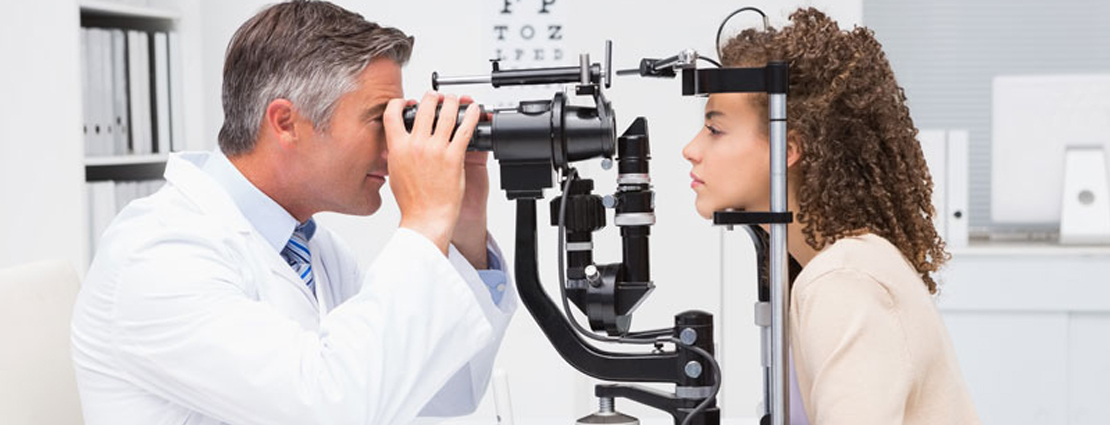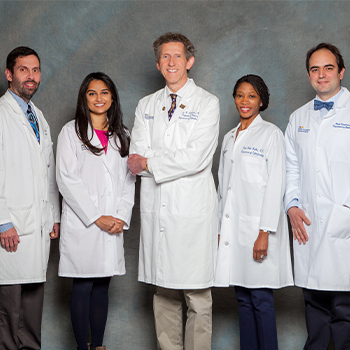We focus on your eye care needs at MedStar Health
If you are struggling with eye or vision problems, our MedStar Health ophthalmologists and optometrists are here to help you see a healthier, happier future. Our expert clinicians can help you maintain good eye health by providing regular screenings, correcting vision impairments, and helping you find relief from the pain and discomfort that can be caused by eye conditions.
We offer cutting-edge technology and techniques, a broad array of multidisciplinary services, world-class facilities, and skilled physicians. As a teaching institution, our care team consists of attending physicians, fellows, residents, and medical students — all focused on providing the most up-to- date, evidence-based ophthalmic care for our patients.
MedStar Health ophthalmologists perform procedures and surgeries at convenient locations throughout the Washington, D.C., and Maryland area. We also provide our services in various settings to enhance patient outcomes. These include hospital-based operating rooms, specialized ophthalmology ambulatory surgery centers, Lasik center, and office-based procedure suites.
Our ophthalmology team also partners with the Georgetown Lombardi Comprehensive Cancer Center providing access to clinical trials and cutting-edge research. Our ophthalmology partnership with Georgetown University School of Medicine and the MedStar Health Research Institute also allows our team to contribute to, and benefit from, world-renowned research.
Services and subspecialities
Conditions and treatments
Conditions
Treatments
Frequently asked questions (FAQs)
-
What is a cataract?
A cataract is a haziness that develops within the lens of the eye. Just as a smudge on a camera lens blurs an image, vision becomes blurrier as the cataract worsens.
-
If I have a cataract, do I have to have surgery?
Surgery to remove the cataract is the only treatment available. Surgical removal is considered only when the cataract begins to interfere with a person's daily activities-driving, reading, watching TV and recognizing faces.
-
How is cataract surgery performed?
Cataract surgery is a quick outpatient surgical procedure. An ultrasound device is inserted through a very small opening in the eye to break the cataract into small pieces, which are removed from the eye. An artificial intraocular lens is then inserted. This lens is permanent and allows the vision to be restored.
-
What can I expect after cataract surgery?
Our results with toric intraocular lenses have been outstanding. This type of lens is inserted at the time of cataract surgery and, in addition to correcting the cataract, can reduce any pre-existing astigmatism that the patient may have. This treatment option allows for the highest-quality vision and the best chance of functioning without glasses. Following the surgery, many patients say that they can see better than they have ever seen before.
-
Can I wear contact lenses if I have dry eyes?
Generally, except in the most severe cases, patients with dry eyes can wear contact lenses. A variety of new lens materials and eyedrops—both prescription and over-the-counter—are available, allowing most patients to wear contacts.
-
Can something be done about the redness in my eyes?
Red eyes can be due to many treatable causes, including dry eyes, allergies and blepharitis (a problem originating in the oil-producing glands of the eyelids). In addition to oral anti-allergy medications, eyedrops are helpful in reducing the symptoms of allergy. Although blepharitis tends to be a long-term problem, there are many treatments available that can help with the symptoms it causes, including over-the-counter eyelid cleansers as well as topical and oral medicine.
-
If I have glaucoma, does that mean I am going to go blind?
Periodic examination, early detection and timely treatment can help prevent blindness due to glaucoma, a condition most often caused by increased pressure in the eye that can damage the optic nerve. Many treatments (e.g., eyedrops, laser and surgical procedures, and others) are available for glaucoma that are very effective in controlling the disease.
-
I see floaters sometimes. Is this a sign of a serious problem?
Usually, floaters are not a sign of a serious problem and don't require treatment. Floaters are actually cellular debris that people can sometimes see as specks that drift in front of their eyes. However, they also can be seen by patients who are developing a retinal tear or retinal detachment. It is very important for patients with new or worsening floaters, as well as new flashing lights- sudden bursts of light in one or both eyes-to have a thorough examination of the retina. That is the only way to distinguish "ordinary" floaters from a more serious problem.
-
Is it true that some medications can affect my optic nerve?
Yes. A thorough eye examination, including evaluation by a neuroophthalmologist, can help detect these problems. With many diseases affecting the eyes, it is important to have regular eye exams to detect and treat changes early-especially.
-
Is there any treatment for macular degeneration?
Until recently, there were no good treatments available for this serious eye condition. However, there are now treatments available for both the "dry" and "wet" forms of age-related macular degeneration-damage to the retina that causes loss of vision in the center of the visual field. In the dry form, a specific combination of vitamins has been shown to be effective in preventing conversion to a more severe disease. In the wet form, medications can be injected to stop the growth of the abnormal blood vessels in the retina.














